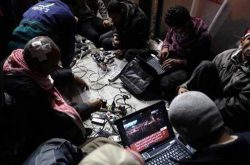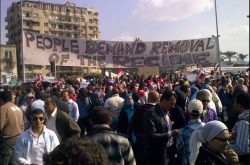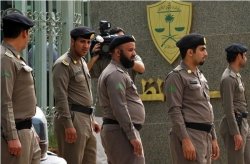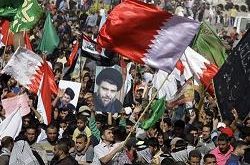Sahar Khamis, Paul B. Gold and Katherine Vaughn compare and contrast the role of social media in the Egyptian and Syrian uprisings, providing a comprehensive review of the tactics used by both activists and regimes. The ability of new technologies to effect political change, they argue, is determined by pre-existing social, political and communication structures.
Read More »‘Not Ready for Democracy:’ Social Networking and the Power of the People–The Revolts of 2011 in a Temporalized Context
Robert Hassan argues that high-speed social networking technology disrupts the traditional rhythms of liberal democracy which, since the Enlightenment, have been based on the slower processes of print-based culture. Digital technology, he maintains, has propelled mass political action in the Arab world, but has left in its wake a political vacuum, with democratic processes struggling to catch up.
Read More »Al Jazeera Television: Rhetoric of Deflection
Mahmoud R. Al-Sadi analyzes the “anti-establishment” discourse of Al Jazeera host Faisal al-Qasim, revealing a complex rhetorical style that deflects Arab radicalism, nudges viewers towards the pragmatism of Qatar’s foreign policy, and thus serves to reinvent Arab autocracy.
Read More »A Proposal for a Dialogue on Media Reform
Muslim Brotherhood spokesman Mahmoud Ghozlan calls for a society-wide dialogue to discuss the reform of both state and privately owned media, including a ban on individuals owning more than 10 percent of a media outlet.
Read More »Saudi Arabia, Egypt, and the Social Media Moment
Nadav Samin looks at the uprising in Egypt from the perspective of Saudi Arabia where an online attempt to initiate nationwide protest in March 2011 met with disinterest from a sector of the digital community. An assessment of social media’s role in the regional uprisings, he argues, must not overlook its ability to reinforce and amplify conservativism in some contexts.
Read More »The Scene of the Crime: October 9th, Maspero, and Egyptian Journalism after the Revolution
In a piece of literary reportage, Maurice Chammah explores media coverage of the violence at Egypt’s state-television headquarters on October 9, 2011, illustrating the growing gap between state-owned and independent media and raising concerns about the blurring line between independent journalists and activists in post-revolution Egypt.
Read More »Civil Society and Web 2.0 Technology: Social Media in Bahrain
Magdalena Maria Karolak looks at the output of Bahraini bloggers and concludes that although the bloggers initially contributed to civil society activism, the polarization of Bahrain society has since penetrated the blogosphere itself.
Read More »The Narrative of Resistance – Bahrain and Iraq
Anne Hagood looks at the political narratives adopted by Iraqi Shi'ites sympathetic to the cause of their fellow Shi'ites in Bahrain and specifically at the parallels Iraqis have drawn between the conflict in Bahrain and their own conflict against the Baathist regime overthrown in 2003.
Read More »Hip Hop & Diaspora: Connecting the Arab Spring
Dr Lara N. Dotson-Renta examines the activities of cross-cultural hip-hoppers and rappers inspired by the Arab uprisings and how they have strengthened the ties between diaspora Arabs and those who continue to live in the region.
Read More »Technology Cannot a Revolution Make: Nas-book not Facebook
Nabil Dajani urges the academic community not to lose sight of traditional and folk media in assessing the role of digital technology in the Arab uprisings, warning that over-reliance on new media platforms to explain the events of 2011 has already led to a failure to understand and anticipate the course of change in the region.
Read More » Arab Media & Society The Arab Media Hub
Arab Media & Society The Arab Media Hub










